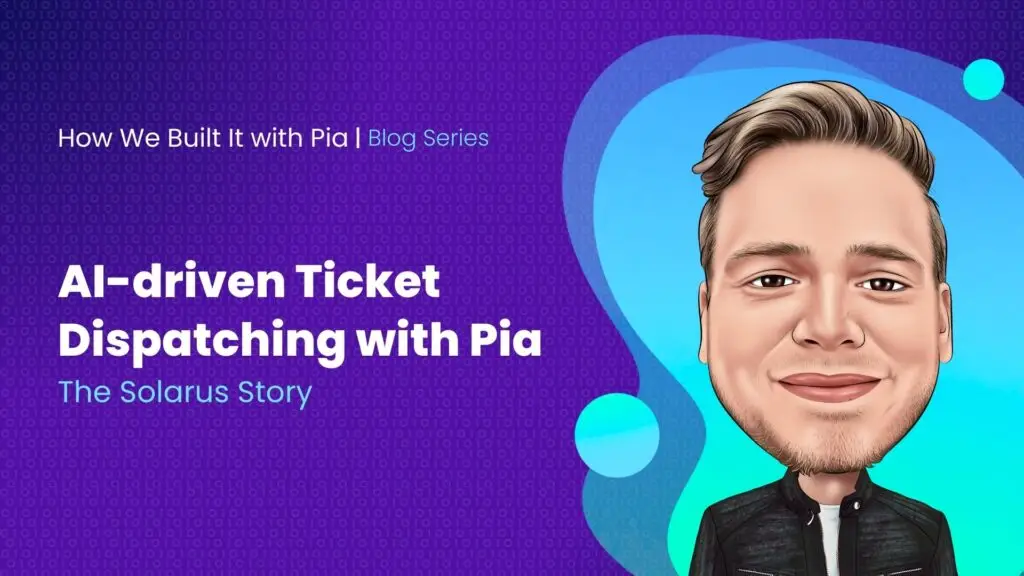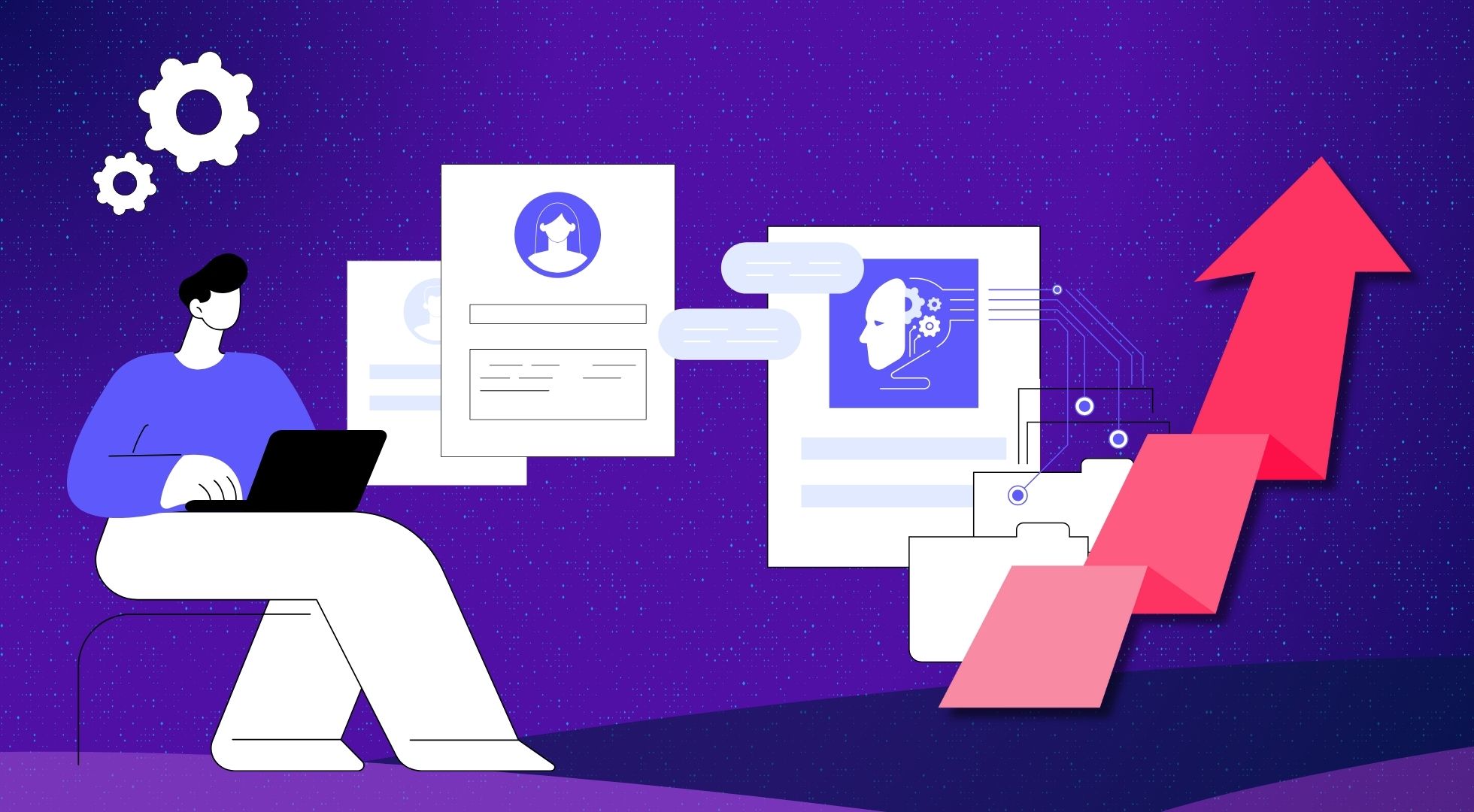AI-Driven Ticket Dispatching with Pia: The Solarus Story


Larissa Varela
Pia, Global Director of Marketing
We absolutely love it when our partners take Pia beyond the 60+ pre-built automations – and they’re building some truly incredible things! To celebrate these achievements, we’re launching the How We Built It with Pia series. Each month, we’ll showcase how our partners are revolutionizing their IT help desks with Pia’s AI-powered transformative capabilities.
This month, meet Matthew Knight, Solarus Technologies’s Systems Integrator. He’s here to share how they conquered dispatching challenges with Pia’s relentless support. Get ready to be inspired and driven to action!
As an MSP, staying ahead of the curve means constantly innovating to overcome challenges. When our lead dispatcher left unexpectedly, we faced a daunting problem: how to keep our ticket assignment process efficient without overwhelming the rest of the team. That challenge sparked an idea, and today, I’m excited to share how we turned it into an AI-powered solution that’s transformed our operations.
The Problem: A Dispatch Dilemma
Our dispatcher’s departure left a gap that was hard to fill. Without them, the responsibility of assigning incoming tickets fell to our service manager, whose plate was already full. For weeks, he juggled dispatching alongside his primary duties, creating bottlenecks and delaying service delivery. We needed a solution—fast.
The Solution: AI-Driven Ticket Dispatching
Enter Pia and the OpenAI API. Using these tools, I built an automation package that’s streamlined our dispatching process. Here’s how it works:
Triage and Data Gathering: When a ticket enters our service board, our custom Pia triage package kicks into gear. It gathers all relevant information about the ticket, including the issue, client details, and any associated priorities.
Smart Engineer Matching: The AI uses predefined data about our engineers’ strengths and availability. It processes this information alongside the ticket data to determine the best match for the job.
Assignment and Notification: Within 30 seconds, the ticket is assigned to the most suitable engineer. An email is sent to the client, letting them know when to expect the engineer to reach out. No delays, no bottlenecks—just seamless service.
The Results: Faster, Smarter Dispatching
Since implementing our AI dispatching package, our ticket management has been completely transformed:
Speed: Tickets are assigned in under a minute—far faster than any manual process.
Precision: Engineers are matched based on skills and availability, ensuring clients get the right help at the right time.
Efficiency: Our service manager is back to focusing on strategic priorities, no longer bogged down by dispatching duties.
This system hasn’t just improved our internal workflows; it’s also enhanced the client experience. Knowing exactly when help will arrive adds a layer of trust and professionalism that sets us apart.
Caveats: The Challenges of AI Dispatching
While AI dispatching has been a game-changer for us, it’s not without its challenges. AI isn’t always perfect, and like any system, it requires fine-tuning and oversight to perform optimally. Here are a few caveats we’ve encountered:
Initial Setup: Training the AI with the right data and configuring the automation takes time and effort. Understanding both the limitations and capabilities of the tools is crucial.
Edge Cases: The AI occasionally struggles with unique or ambiguous tickets that fall outside its training or data parameters, requiring manual intervention.
Maintenance: As our team evolves and client’s needs change, we need to regularly update the data and prompts to keep the system aligned with real-world conditions.
That said, with the right resources and a commitment to iterative improvement, these challenges are manageable. Our team has learned to monitor and adjust the system as needed, ensuring it continues to work effectively and efficiently. The time saved, and the improvements in accuracy far outweigh the effort required to keep things running smoothly.
Why This Matters for MSPs
In the fast-paced MSP world, automation isn’t just a luxury—it’s a necessity. With tools like Pia and OpenAI, we can tackle even the most challenging problems with innovative solutions. For us, this project has been a game-changer, and I’m proud to showcase how it’s helped us better serve our clients.
If your MSP is facing similar challenges, or if you’re curious about how automation can elevate your operations, don’t hesitate to reach out. Together, we can build smarter, faster, and more reliable IT solutions for the future.
Pia partners continue to impress us with their innovative use of the platform, developing custom automations to tackle their unique help desk challenges. Triage and dispatch are common pain points for many MSPs. With our latest platform release (December 2024), we’ve introduced powerful automations, including ticket analysis, dispatch, AI autostart, and more—designed for all partners to leverage. Watch the full Pia AI Triage demo here: Revolutionizing MSPs with Pia’s New AI Triage.
More to explore

How MSPs Use Workflow Automation to Scale Smarter and Deliver Better Service
Workflow automation enables MSPs to standardize processes, reduce onboarding time, and improve accuracy across clients. Learn how automation unlocks efficiency, boosts client satisfaction, and helps

Generative AI vs. agentic AI: What MSPs need to know
Explore how agentic AI is reshaping MSP operations—acting as an autonomous teammate that makes real-time decisions, reduces manual effort, and scales service delivery intelligently.

Introducing Pia Integration with Nilear MTX Pods
Pia now integrates with Nilear’s MTX Pods, bringing AI-driven triage and automation to dispatch and workflow tools—helping MSPs streamline service delivery like never before.
